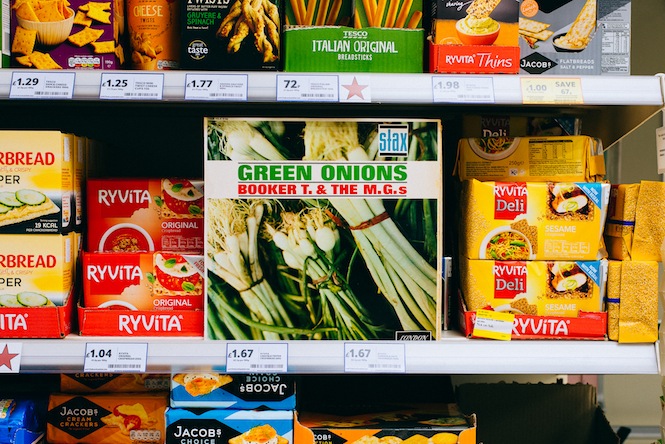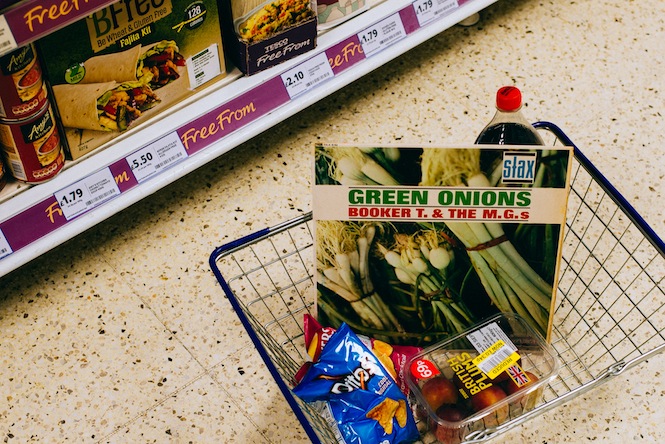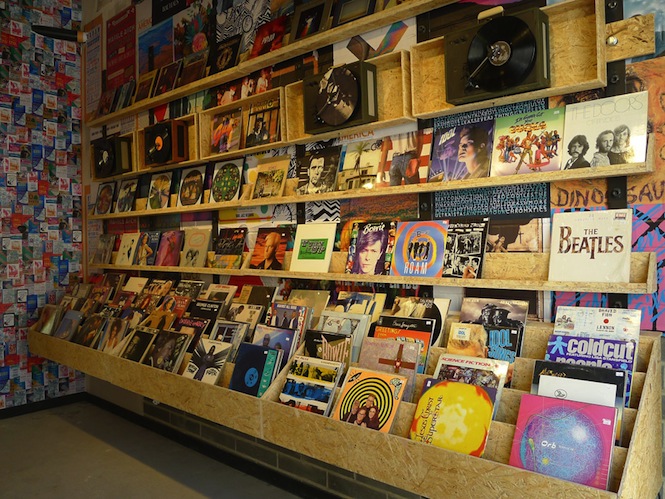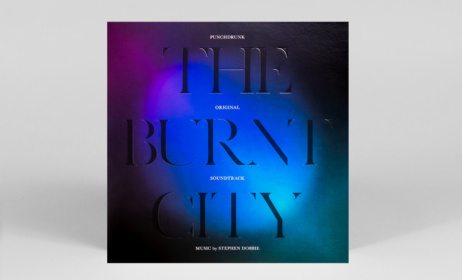Published on
September 3, 2015
Category
Features
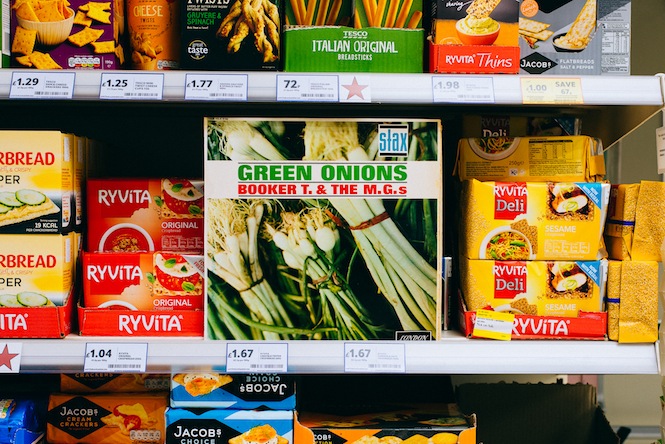
Tesco has, somewhat tentatively, entered the vinyl game. With Amazon launching an exclusive vinyl series and Urban Outfitters establishing their claims as the high street’s largest (read: only) global vinyl retailer, there’s a fear that the ground hard won by independent record shops is about to be compromised.
However, as we discussed in our recent podcast on supply and demand in the vinyl industry, debates around increased availability of records all lead back to how records are made, not where they are sold. And for the open-minded record collector, opportunities are beginning to arise in unusual places. Pete Paphides takes a step back from the crowded aisle and finds a bigger fish to fry.
Words: Pete Paphides
Erm, let’s not get too carried away. Tesco haven’t started stocking records. They’re stocking a record. And if that goes well, they might stock a few more. But nevertheless, the news, announced this week, that 50 selected Tesco stores will be selling the new Iron Maiden album on vinyl was enough to confirm what copper-topped pop-cultural bellwether Geri Halliwell portended back on Christmas Eve 2014 when she tweeted, “I just bought some vinyl – it’s coming back.” From Tesco’s point of view, it’s a reasonably safe bet. As their music buyer Michael Mulligan pointed out, “In the last year we began selling record decks in our largest stores and initial sales are very encouraging, so giving our customers some new vinyl to play on those decks seems like the logical next step.”
On social media, the reaction suggested that most people regarded such a development as an inevitability. As far back as 2011, John Lewis commenced an experiment to stock canonical titles by the likes of Massive Attack, Nirvana and The Velvet Underground. Next to the browsers of records, the department store helpfully displayed a range of frames in which people who didn’t actually want to play them could put them. More recently, when news broke that Urban Outfitters is the largest global stockist of vinyl albums, outrage erupted in the blogosphere. In fact, Urban Outfitters is only global stockist of vinyl, but that didn’t dampen the outrage of one writer at Dazed & Confused, who fumed, “Urban Outfitters doesn’t just make money off selling offensive sweatshirts and smiley face crop tops to your little sister for V Festival.”
The London-based style bible – which until this point hasn’t been especially well-known for representing the interests of incurably vinyl-centric hoarders who would sooner saw off their left leg than not hitch 70 miles at 4am on Record Store Day in order to queue for a nine-inch Daniel Johnston picture disc of which only 230 have been pressed – continued in this manner, declaring that buying a record from Urban Outfitters feels entirely different from buying one elsewhere: “You get the opposite experience of what you’d get in an independent music store, which offers a more personalised and curated selection. When you look through a stack of records in the store, you’re essentially looking at the vinyl equivalent of an Amazon experience.”
I guess I can see where they’re coming from, but actually, with the exception of Amazon, who are happy to sell anything from Cecil The Lion outfits to fake tampons that allow you to smuggle alcohol into venues, every store’s inventory is curated in some way – even that of Tesco with their current selection of, erm, one record. Reacting to the supermarket’s announcement, The Next Web’s European editor, Ben Woods reasoned that “the few independent record shops will be hurt by the encroachment. Supermarkets have already driven down the living wages of food producers, and while vinyl won’t be a big proportion of Tesco’s sales, it’s a few less sales than those independent shops get.”
The truth is, I think, a little more complicated than that. In 2007, when sometime Rough Trade store manager Spencer Hickman came up with the idea of Record Store Day, the idea didn’t extend beyond having a day that helped raise awareness of the valuable service provided by the independent record shop. The inevitable result of Record Store Day’s snowballing success has been the increasing involvement of major labels both feeding and creating an interest from mainstream music fans who, very often, would rather buy new pressings of records they threw out when CDs came along. The fact that you can pick up a copy of Ultravox’s Vienna album or a seven-inch of Duran Duran’s ‘Is There Something I Should Know’ for next to nothing at almost any second-hand record shop hasn’t stopped them getting identical Record Store Day reissues.
Of course, if that’s how people want to spend their money, then fine. But, for smaller independent labels, without whom there wouldn’t have been a Record Store Day, this creates a major headache. I can’t think of any label that fits the obsessive-attention-to-detail, sleepless-nights, labour-of-love archetype of a small indie than Nick Halliwell’s Occultation label. It’s in everyone’s interest to keep labels like Occultation going because in a world where all music is streamed, these imprints simply couldn’t exist. “After a full year on Spotify,” says Halliwell, “The label got a total of £3.50 [Spotify royalties] for six or seven artists. I was supposed to deduct costs, then split the profits with the artists. How? Financial fission? To cover the cost of one day in a medium range studio would require 200,000 Spotify plays. It made me realise that we’re all about physical artefacts and if that makes me a Luddite, then lead me to the looms.”
Based in Exeter, Occultation is run in tandem with a New Zealand label called Fishrider. The former specialises in releases by venerable post-punk and indie acts like The Distractions, The June Brides and The Wild Swans (as well as Halliwell’s own act The Granite Shore), while the latter bangs the drum for the latest generation of bands to emerge from Dunedin, the college town which once served as the base for the legendary Flying Nun label. In Britain, Occultation puts out all of the Fishrider label’s records, while in New Zealand, Fishrider does the same for Occultation.
Lately though, Halliwell has been experiencing increasing trouble getting his records out on time. “It’s taking six months for small labels to get vinyl pressed,” he explains, “Pressing plants are working around the clock reproducing the contents of any charity shop. I was in HMV on Friday and it was full of new pressings that cost £19.99 of things you can find in Oxfam for £2.99.” Back in 1987, the turnaround time for getting a record pressed was around three weeks. This much I remember because, at the age of 17, I had a three track seven-inch flexi-disc made up to give away with the fanzine I used to edit. In a state of high anticipation, I remember getting the coach from Birmingham to pick up the records from Lyntone, the pressing plant just off Holloway Road and stuff as many as I could in the pages of my fanzine before leaving as many as I could in record shops around London.
These will be logistically tricky times for small indies
Six years later, I moved to London and found myself living around the corner from Lyntone. By the time, I realised why this area had seemed so naggingly familiar to me, I walked past Lyntone and saw that the site had been boarded up, pending renovation into an apartment block. The vinyl revival didn’t come quite soon enough for Lyntone, and it almost claimed the life of the old EMI pressing plant in Hayes. This was the factory where the first ever copies of Dark Side Of The Moon and Revolver were made. That it remains gloriously unchanged is thanks in no small part to Roy Matthews, who managed the plant until the decline in vinyl sales prompted EMI to sell it. As an EMI employee, Matthews’ final job here was to give a guided tour to the property developers who had bought the premises and were so swept away by the romance of the place that they decided to but it in order to keep it going. Now owned by The Vinyl Factory, the plant is once again thriving, working flat out to sate increasing demand for the format.
So where to from here? In the immediate future, these will be logistically tricky times for small indies. But finally, belatedly, there are signs that the good old fashioned push and pull of supply and demand is beginning to address the problem of exponentially rising demand for vinyl. In America, one pressing plant, Furnace, recently went to extraordinary lengths to acquire ten Toolex Alpha pressing machines from a storage unit in Mexico City. The full saga of the operation to move them to Furnace’s Virginia HQ is worth reading in full on here. It turns out that the process of getting ten disused one-tonne record pressing machines to the Texan border is quite tricky. “During the second day of loading,” begins one paragraph, “the staff caught wind that questions were being asked about the value of the equipment and were later advised not to speak in English to avoid drawing unwanted attention to the operation.”
Photo: Urban Outfitters
Furnace’s adventure might be the most extreme story surrounding the expansion of vinyl productivity, but it certainly won’t be the last. Urban Outfitters’ vinyl departments continue to do brisk business. If you think your tastes are more specialised than the Beyonce or Florence & The Machine albums that they keep in stock, then you might still find it worth your while to drop in. Urban Outfitters shoppers’ reluctance to take a punt on recent albums by Young Fathers and Ariel Pink meant that I was able to pick them up from the store at a fraction of their original price. If Tesco follows suit with a chart-based vinyl range, the benefits for the non-tribal vinyl lover will surely outweigh the disadvantages. With the promise of shelf space at Tesco, major labels will almost certainly deem it worth their while to press vinyl copies of albums that, things being as they are at the moment, almost certainly wouldn’t get a vinyl run.
My first records weren’t bought in specialist shops and neither, I suspect, were yours. The places where I fell in love with vinyl were shops such as Woolworths, Boots and WHSmiths. And when my tastes became more niche, I branched out into smaller independent shops. The involvement of the high street chains isn’t detrimental to a vinyl revival. It’s beneficial to it.

